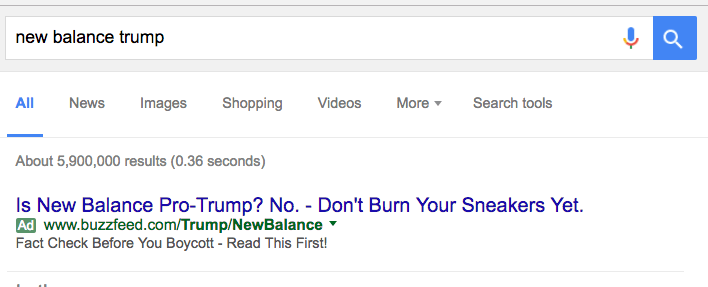Secure your place at the Digiday Publishing Summit in Vail, March 23-25

As the dust settles on this election, platforms and brands alike are facing a lot of tougher-than-usual questions. From a fake-news furor to metrics blunders, Facebook alone had a busy week of putting out fires. Here’s our week’s top stories.
Advertisers shrug at Facebook’s fake news problem
It took less than a week for Facebook to make moves to limit the presence of fake news on its platforms. Will it be enough to keep Facebook from losing any advertising partners, though? It seems so: Facebook’s peerless size and targeting are hard for advertisers to find elsewhere, and while many brand advertisers have to worry about the context their ads appear in, many of the performance-based marketers that have just started using Facebook care a lot less about brand environment.
“This is an entrenched, successful partner,” said Jonathan Adams, chief digital officer of Maxus. “As long as they’re responsive, [they] will be able to retain nearly all of their clients.”
Ad tech underwrites the alt-right
Meanwhile, the election introduced many Americans to the alt-right faction of the conservative movement — and along with it, the growing influence of advertising technology on online media. In addition to Breitbart News, a whole host of white nationalist sites owe their existence, at least in part, to programmatically driven ads.
“It becomes a lot easier for buyers to lose a degree of control over where their ads run,” said Ari Paparo, CEO of Beeswax. It’s hard to cut off the ad supply from those sites because even if Google and Facebook succeed in weeding them out, there are other networks that will take them, along with other reasons.
New Balance, under fire, backpedals on Trump comments
The shoe brand, once beloved by liberals, is on the defensive after a spokesperson said the company endorses Trump’s trade policies — and a Neo-Nazi website called the company’s kicks “shoes for white people.” New Balance is now in damage-control mode.

Bill Simmons’ The Ringer struggles five months in
In non-election news, when sports media heavyweight Bill Simmons announced he was launching The Ringer this past spring, sports and pop culture enthusiasts and Grantland devotees rejoiced. In the months since its June launch, however, the traffic appears to be heading down, despite favorable reviews from sports media observers and nearly universal regard among advertisers.
“Any issues the Ringer might be having are not a reflection of the quality of work being done there,” said J.A. Adande, an ESPN columnist and the director of the sports journalism program at the Medill School of Journalism, Media and Integrated Marketing Communications. “They are a reflection of the value of the ESPN real estate in the sports landscape.”
Brands want better metrics from Snapchat
But it’s not an uncomplicated love: One big sticking point is lack of measurement. Currently, Snapchat provides location information but nothing on clicks or other metrics to know if the ads work, including first-party data that allows brands to track certain users.
“They really don’t have the kind of data Facebook does,” said one media buyer who declined to be named. “They’ll never have the depth Facebook does, and to get that depth, marketers have to overlay third-party data on top of it.” That kind of in-the-weeds stuff is hard for brands.
Brands have to deal with Twitter’s ‘angry, impatient people’
A digital marketing manager from a high-end cosmetics brand tells us Twitter is “more toxic than ever” for brands. We granted her anonymity in exchange for candor. Here’s what she had to say about customer service on the platform:
“Within the last year, it’s gotten really bad. Twitter has become a less exciting and engaging space in general, but part of the reason is because it has become a customer service-based channel. People are used to getting a quick response. When I think of it now, I think of lots of angry, impatient people.
More in Media

Media Briefing: As AI search grows, a cottage industry of GEO vendors is booming
A wave of new GEO vendors promises improving visibility in AI-generated search, though some question how effective the services really are.

‘Not a big part of the work’: Meta’s LLM bet has yet to touch its core ads business
Meta knows LLMs could transform its ads business. Getting there is another matter.

How creator talent agencies are evolving into multi-platform operators
The legacy agency model is being re-built from the ground up to better serve the maturing creator economy – here’s what that looks like.





